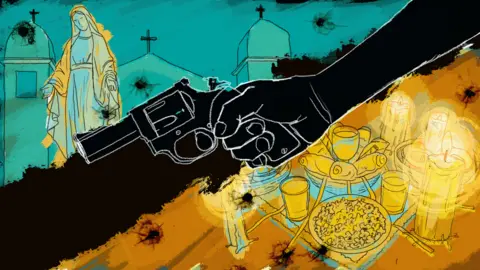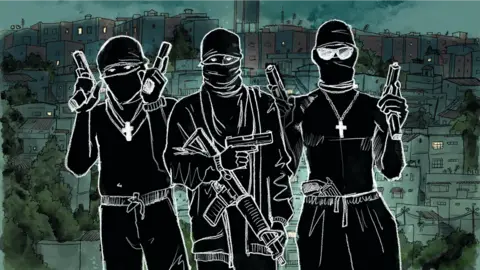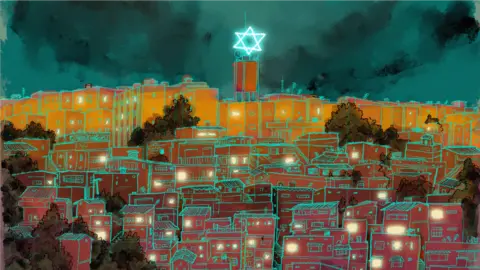
 Daniel Arce Lopez/BBC
Daniel Arce Lopez/BBCWhen police in Rio de Janeiro confiscate blocks of cocaine and bundles of marijuana, they may be found bearing a religious symbol – the Star of David. This is not a reference to the Jewish faith, but rather to the belief of some Pentecostal Christians that the return of the Jews to Israel will lead to the second coming of Christ.
The gang selling these branded drugs is Pure Third Command, one of the most powerful criminal groups in Rio, with a reputation for making opponents disappear, and for fanatical evangelical Christianity.
They took control of a group of five slums in the north of the city — now known as the Israel Complex — after one of their leaders received what he believed was a revelation from God, says theologian Vivian Costa, author of the book Biblical Drugs. Merchants.
She says that gang members see themselves as “soldiers of crime,” and that Jesus is the “owner” of the territory they control.
Controversially, some have called them “Narco-Pentecostals.”
Gun and Bible
One man with experience in crime and religion – but not at the same time in his case – is Pastor Diego Nascimento, who became a Christian after hearing the gospel from a gangster who carried a gun.
Looking at him, it is hard to believe that this boyish-looking 42-year-old Wesley Methodist minister with a ready smile and dimples was once a member of Rio's notorious Red Command crime gang and ran its activities in the city's Villa Kennedy slum.
Four years in prison on drug charges were not enough to make him give up crime. But when he became addicted to cocaine, his standing in the gang declined.
“I lost my family. I practically lived on the street for about a year. I went as far as selling things from my house to buy crack,” he says.
At that point, when he was at rock bottom, a known drug dealer in the slum called him out.
“He started preaching to me, saying there was a way out, that there was a solution for me, which was to accept Jesus,” he recalls.
The addicted young man took this advice and began his journey to the pulpit.
Pastor Nascimento still spends time with criminals, but now it's through his work in prisons, where he helps people turn their lives around, as he did himself.
Despite being converted by a gangster, he considers the idea of religious criminals a contradiction in terms.
“I don't see them as evangelical believers,” he says.
“I see them as people who are on the wrong path and fear God because they know that God is the one who watches over their lives.
“There's no such thing as being an evangelical and being a thug. If someone accepts Jesus and follows the commandments of the Bible, that person can't be a drug dealer.”
 Daniel Arce Lopez/BBC
Daniel Arce Lopez/BBC“Living under siege”
According to some projections, evangelical Christianity will overtake Catholicism as the largest religion in Brazil by the end of the decade.
As it has grown, the Charismatic Pentecostal movement has had particular resonance with people living in gang-ridden slums, and some of these gangs now rely on elements of the faith they were raised with to exercise power.
One accusation against them is that they use violence to suppress Afro-Brazilian beliefs.
Rio's poor communities have long lived “under siege” from criminal gangs, and this is now affecting their religious freedom, says Cristina Vitale, a sociology professor at the Federal University of Fluminense in Rio.
“In the Israeli compound, people with other religious beliefs cannot be seen practicing them openly. It is not an exaggeration to talk about religious fanaticism in that area.”
Umbanda and Afro-Brazilian Candomblé houses of worship have been closed down in surrounding neighborhoods as well, Vital says, with gangsters sometimes spray-painting messages on walls such as “Jesus is the Lord of this place.”
Followers of Afro-Brazilian religions have long faced prejudice, and drug traffickers are not the only people they target.
But Dr. Rita Salem, who heads the Rio police's anti-racial crimes and intolerance division, says threats and attacks by drug gangs have a particularly strong impact.
“These cases are even more dangerous because they were imposed by a criminal organisation, by a group and its leader, who imposes fear on the entire region it controls.”
It indicates that an arrest warrant has been issued for the man believed to be the number one criminal leader in the Israeli compound, for allegedly ordering armed men to attack an African-Brazilian temple in another poor neighborhood.
 Daniel Arce Lopez/BBC
Daniel Arce Lopez/BBC“A new crusade”
While allegations of religious extremism in Rio's favelas first drew attention in the early 2000s, the problem has “extremely worsened” in recent years, according to Márcio de Gajon, coordinator of religious diversity at the Rio City Council.
Gajon, a papalorixa (head priest) of the Candomblé religion, says the issue has now become a national issue, with similar attacks occurring in other Brazilian cities.
“This is a form of new crusade,” he says. “The bias behind these attacks is both religious and ethnic, with outlaws demonizing religions in Africa and claiming to banish evil in the name of God.”
But religion and crime have long been intertwined in Brazil, says theologian Viviane Costa. In the past, gangsters sought protection from Afro-Brazilian gods and Catholic saints.
“If we look at the birth of the Red Order, or the birth of the Third Order, African religions (and Catholicism) have been around since their beginning. We see the presence of Saint George, the presence of (the Afro-Brazilian god) Ògún, the tattoos, the crosses, the candles, the offerings.
“For this reason, calling it Pentecostal drugs is a reduction of that historical and traditional relationship between crime and religion. I prefer to call it 'drug religiosity.'”
Whatever one calls this combination of faith and criminality, one thing is clear: it jeopardizes the right enshrined in Brazil's constitution – the right to religious freedom.
This is another way that violent drug traffickers harm communities forced to live under their rule.








